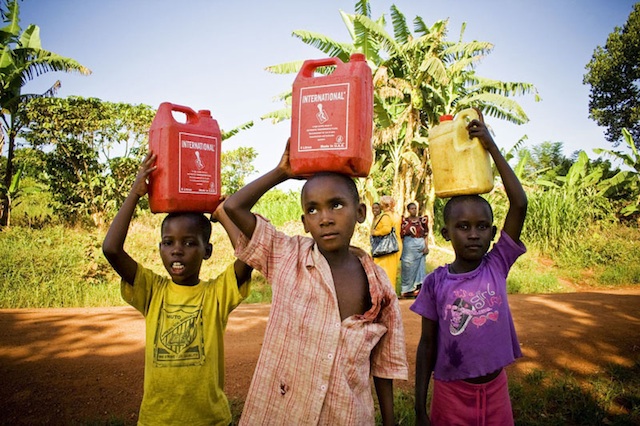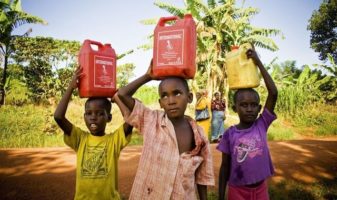
By: Kimberly L. Bryant
In Nantwala, Buikwe District, Central Uganda, students play at recess on the lush grounds of Erinah Manjeri Mixed Primary School. In service since 2005, the school – like the village it’s in – has no power, no plumbing. Yet life here is vibrant.
Volunteers occasionally come to Nantwala from abroad to donate time and skills at Erinah Manjeri – teaching English, helping with construction. It’s a refreshing village experience they get in exchange, complete with local cuisine of matoke, rice and cassava, cooked traditionally over hot coals. The evenings are filled with lively chatter, the expansive farm fields sparkle with fireflies – all beneath a star-filled Ugandan sky.
But completely idyllic Nantwala is not. The HIV/AIDS epidemic has taken its toll here leaving many children without parents. Orphaned children often become the responsibility of an elderly or disabled grandmother or older woman whose own children are grown. In most cases, this caretaker lacks the ability to properly look after and educate the child.
Masitusla Nantongo (82) is one example. In her home, she takes care of more than five children of different parents. After losing their mother to AIDS, the children’s father, Salongo Semakala Muhamad (50), moved to Uganda’s capital city of Kampala, where he struggles to make ends meet. Salongo’s sister-in-law died from the virus shortly thereafter, leaving behind a handicapped child, now too under this grandmother’s care.
A similar case is that of Abigail Nabwire (87), also the sole caretaker of a grandchild, Kyagulanyi Twaha (15). Kyagulanyi’s parents are believed to have died from AIDS 12 years prior. Many rural grandmothers and orphans live similar existences throughout Nantwala, struggling to afford better opportunities.
Enter Erinah Manjeri, the inspiration for Nantwala’s premier Mixed Primary School. When school founder Mark Bbumba (54) met Erinah Manjeri in 2000, she too was a very poor and elderly woman. Living in Nantwala and responsible for a number of orphans, she had few resources to provide for them, let alone pay for their schooling. Frustrated, she pleaded with Bbumba to help improve this desperate situation for all involved. He agreed.
Bbumba began an organization aimed at helping educate the children of Nantwala – those like Masitusla Nantongo’s girls and one of Abigail Nabwire’s children, who attended for years until Abigail could no longer afford it – all orphaned by HIV/AIDS or other tragedies and left to the care of senior village women and rural grandmothers like Erinah. This is the context in which the Erinah Manjeri Mixed Primary School was born. And although Mark Bbumba lives and works as a farmer in the nearby city of Lugazi, he visits the school several days each week to ensure that classes and ongoing construction are running smoothly.
Math, science, history – a range of subjects are taught in the school’s freshly-painted yet dusty, sun-lit classrooms, where students sit on crooked wooden benches, attentive to instruction and cooled by whatever breezes find their way in from out-of-doors.
Yet as positive as all this seems, it’s still not enough. Academic opportunity for the majority of young people in Nantwala is virtually nonexistent. Most children in the village stop their schooling after finishing P7, the last level offered at Erinah Manjeri, the school being unable to afford the higher fees for implementing secondary education.
Though Erinah Manjeri and the few schools in the neighbouring village of Lweru educate their students as best they can, resources – even basic school supplies like paper and pencils – are scarce. Many students go to school without uniforms, notebooks or breakfast to sustain them throughout the day.
For students who can afford it, a modestly-priced school lunch of Posho – a traditional Ugandan dish consisting of maize flour and beans – is provided on a daily basis. But their numbers total only about 30 of roughly 140 students. The remainder use the mid-day break in search of sugarcane or maize from nearby fields to quell their hunger.
Challenges remain for Erinah Manjeri Mixed Primary School in the village of Nantwala, Uganda. Yet theirs is a story of action — locals pooling resources for change. And if mega-watt smiles of school children are any indication – there’s enough energy here for more.
